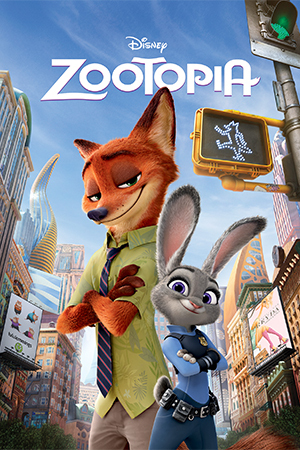Margo Williams In the tradition of Animal Farm, Watership Down, and Veggie Tales, Zootopia (released in the U.S. on March 4, 2016) uses animal allegory to introduce concepts of morality to children and young adults. The film seeks to empower minorities to overcome stereotypes to actualize their goals and to promote the notion that tolerance of diversity is the only way to allow everyone to become the best version of themselves. Throughout the film, the dynamic relationship between the two main characters, slick con-artist fox Nick Wilde and Zootopia’s first-ever bunny cop Judy Hopps, highlights real-world human concerns, such as “groupthink,” which can lead to unfounded division and expectations of conformity. These side effects are addressed in our community at Latin often by minority groups that work to abolish this division and establish individuality that is independent of their physical appearances or preferences. What sets Judy Hopps apart from the other animals in the film is that she persistently believes in her own ability to overcome the limitations that have been placed on her because of her species. By contrast, Nick Wilde seeks to ensure that she stays within her boundaries. He insists that she goes home to be a carrot farmer with her family, and says, “I’m born a sly fox, and you’re born a dumb bunny, that’s who you are. There’s no use trying to get out of these boxes that society’s put us into.” All through the film, however, the bunny and fox work together to solve a crime and, in the end, they realize that expecting one another to behave in a predetermined way or to do things only within set boundaries unfairly limits one’s potential. Judy Hopps says, “We all make mistakes. Which means―hey, glass half full! ―We all have a lot in common. And the more we try to understand one another, the more exceptional each of us will be. But we have to try. So no matter what type of animal you are, from the biggest elephant to our first fox, I implore you: try. Try to make the world a better place. Look inside yourself and recognize that change starts with you. It starts with me. It starts with all of us.” There is something perhaps more important than the fact that the entertainment industry has recently begun incorporating meaningful messages into children’s films. The fact that Zootopia’s spells out a solution to the problem, something that activism in film has yet to address. If our community were to begin sharing films that not only educate us about the problem, but also provide us with a solution that we then can act on, students will, more than likely, take action. At Latin, there are sometimes issues presented to the community as a whole that aren’t explicitly connected to a solution. It’s clear that the collective mindset at Latin is that when we see injustice, we want to help the situation, but when solutions aren’t provided, both the presenting and the audience are left frustrated by inaction. Of course, it’s not always easy to find a solution to worthwhile causes, like world hunger and global warming, but to educate students on the topic is simply not enough. In order to be effective, even if it’s an action that will make a small impact on a huge problem, an individual’s purpose towards helping a cause is lost upon them until it’s made obvious. ]]>




































